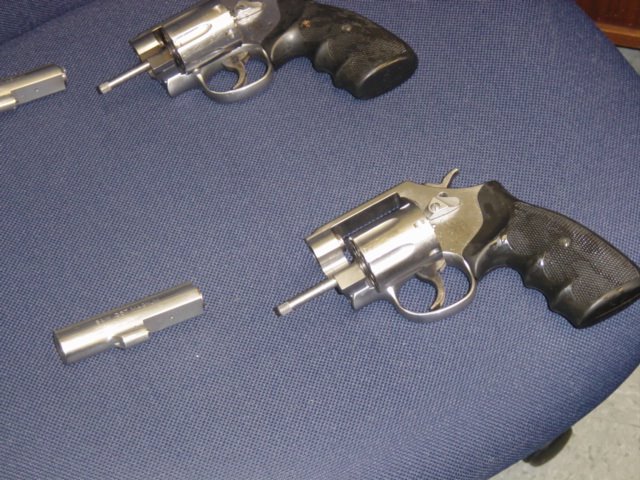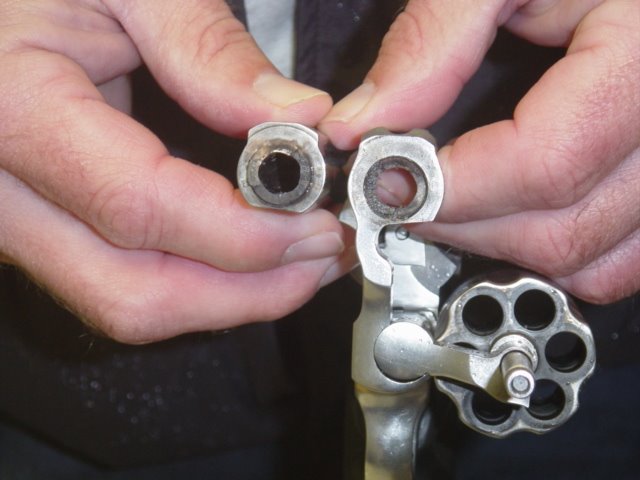Saturday, August 02, 2008
S&W FAULTY REVOLVERS
State wants faulty guns replaced
Dan Kane, Staff Writer
State prison officials want gunmaker Smith & Wesson to replace hundreds of revolvers after dozens failed to shoot and the barrels broke off of others upon firing in training exercises.
The company has witnessed the problems firsthand. Last month, three company representatives met with state prison officials at a shooting range near Smithfield to test about three dozen revolvers.
Four of the revolvers didn't fire when a state weapons instructor pulled the trigger. The cylinder that holds the ammunition jammed on two revolvers. Then, the barrel broke off as the instructor fired a different model with a longer barrel, just as 14 others had in practice shoots dating back to 2003.
"In one sense it's funny," said Chief Deputy Correction Secretary Dan Stieneke. "In another, it's alarming."
In previous tests of revolvers purchased in 2004, roughly one in four misfired. They are .38 caliber Model 64s, which have 3-inch barrels. The .357 caliber Model 65s had the problem with barrel breaks. Test fires of a third revolver, the slightly smaller Model 60, resulted in cracked or sheared barrels in four cases.
No weapons have failed in the line of duty. Stieneke said the guns will remain in service while the department tries to resolve the problems, but annual in-service training will cease until a solution is found. New hires will receive weapons training because there are enough reliable revolvers to train them.
"On the one hand, statistically [the revolvers' performance] is not bad, but it's just the safety issue," Stieneke said. "That kind of failure gets people's attention."
The weapons are assigned to probation officers who keep track of probationers with more dangerous criminal histories, and to correction officers who patrol prison perimeters and escort inmates outside the facilities. (Those correction officers often carry rifles and shotguns as well.)
Correction officers inside prisons do not carry guns because there is a much greater risk that they could fall into inmates' hands. They carry pepper spray and batons.
Correction officials have asked the company to replace the 500 Model 64s purchased in 2004. They might extend that request to replace all of the department's 5,000 revolvers.
If Smith & Wesson does not replace the guns, the department might file a lawsuit or turn to taxpayers for help. Replacing the guns, which cost about $320 each, would come to more than $1.5 million. The department also would have to replace ammunition, holsters and other accessories, and retrain its officers to use the replacement weapons.
"We're at a point where if we have to make a quick switch, it's going to cost millions of dollars, and it's going to take a lot of training and effort to get back up to speed," Stieneke said.
Smith & Wesson officials did not return repeated phone calls for comment. Based in Springfield, Mass., Smith & Wesson is one of the nation's largest gunmakers.
The company's guns have drawn criticism from other law enforcement agencies. In 2001, New Jersey canceled a purchase of about 3,200 semi-automatic pistols from Smith & Wesson for its state police because of high malfunction rates.
North Carolina prison officials have been using Smith & Wesson revolvers for at least 20 years, even as many other law enforcement agencies have switched to higher-powered, semi-automatic handguns that carry more rounds.
Stieneke said that no one noticed a troublesome trend with the revolvers until late 2004, when trainers began seeing misfires with the new batch of Model 64s. A misfire is when the trigger is pulled and nothing happens.
In March and April 2005, the trainers tested all 500 of the new batch of handguns at shooting ranges across the state. They reported misfire rates of between 11 percent and 43 percent.
In the meantime, another problem emerged: barrels dropping or flying off the Model 65s during firing. The department surveyed trainers across the state and counted up 14 cases of barrel failure in the past three years.
Both problems led to the visit by Smith & Wesson on Feb. 21.
Stieneke said the revolvers are no longer a popular item and that might be contributing to their unreliability. For example, the department has had to special order the Model 65s in recent years.
That, along with the weapon failures, has Stieneke thinking it is time to follow the rest of the law enforcement community and switch to semi-automatics.
Staff writer Dan Kane can be reached at 829-4861 or dkane@newsobserver.com.

